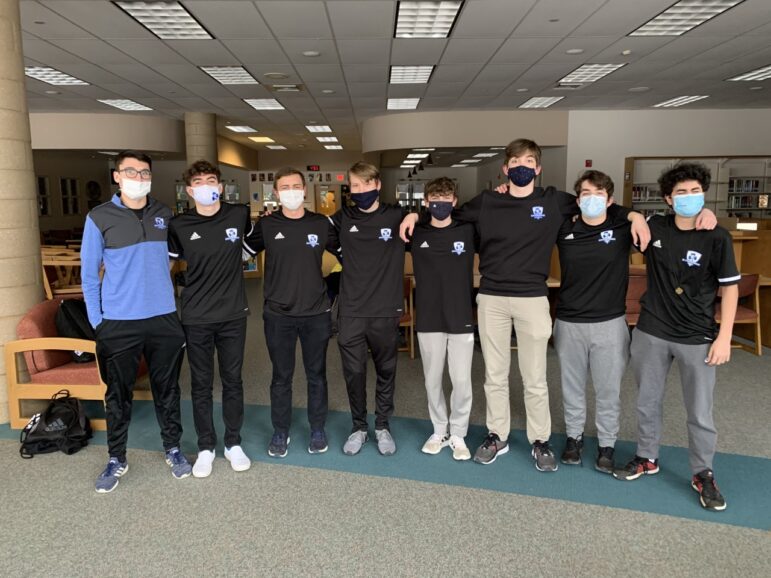By NORA MOUGHARBEL
Capital News Service
LANSING — A growing number of Michigan high schools are getting in on the fun of esports.
More than 50 are registered with the Michigan High School Esports Federation, a nonprofit league created by educators in 2019. They join over 170 U.S. colleges and universities with varsity esports programs – including 18 in Michigan.
Esports is a term used to describe competitive, multiplayer, organized video gaming.
Candace Byrnes
East Kentwood High School students compete in the first round of the 2019 StateChamps! Esports Tournament at Lawrence Tech University.
Southfield’s Lawrence Technological University was among the first in the state to embrace esports when it began hosting tournaments for high schools five years ago.
“It was a bit like pulling teeth trying to get these high schools to recognize what we were trying to do,” said Candace Byrnes, a Lawrence Tech graduate and State Champs Esports Show Host. “Esports has always been a thing nationally, but locally and statewide it struggled for a little bit to get any bit of funding or any adults really to be involved and recognize it as a positive thing,”
So what changed?
Lori Flippin, the STEM initiative leader for the Great Lakes Bay Regional Alliance, a Freeland-based economic development agency that supports programs to improve the economy and quality of life in the Saginaw Bay area, said it all comes down to research and affordability.
Research shows esports “improves science scores. It improves math scores. It helps with well-being for students once they build that connection to a group,” Flippin said.
And unlike other science, technology, engineering and math programs that often come with a hefty price tag, she said, “it’s really not that expensive to run an esports program, assuming that a school district already has the computer technology, and they may only need to do just a few enhancements.”
Although the COVID-19 pandemic has devastated many industries, it may have advanced esports at the high school level. In March 2020, the Michigan Association for Computer Users in Learning held an esports summit allowing districts from across the state to learn more about esports.
“I think that awareness kind of peaked at that time, and then knowing that it could be possible with COVID was just another reason why it was a good time to start,” Flippin said.
Detroit Catholic Central High School in Novi formed its esports team in March 2020 – just as the pandemic hit. The team won the 2020 State Champs Rocket League Tournament and now has 71 players.
While Michigan was in lockdown, esports “kept everyone connected,” head coach Stephen Juncaj said.
He said the esports team provided students with a sense of normalcy when they felt unmotivated or fatigued during the pandemic.
Esports participation also serves as a motivational tool in more normal times and is associated with higher GPA and improved attendance, according to the High School Esports League.
“It’s like any other athletic team. It’s a privilege to be on it,” Juncaj said. “So if your grades start slipping, you’re not allowed to participate in practices or games.”
This is the first time many of his students participated in official school extracurricular activities, Juncaj said.
“There’s kids who’ve literally told me, ‘I haven’t done anything after school, at all, until I found this,’” he said. “So it’s really been a great outlet for some kids who never even thought about, ‘Oh, I could do something for the school and kind of be involved.’”
As it expands at the high school level, esports does face challenges.
For example, online gaming is often associated with violence.
Initially, Detroit Catholic Central administrators didn’t want students playing Fortnite, Overwatch or Valorant – three popular games that include shooting.
To convince them, Juncaj pointed out that the school has a skeet shooting club where students handle real shotguns.
“If they’re responsible enough to use the real ones, could we potentially let them use the virtual ones that don’t do any harm through the computer?” he said.

Candace Byrnes
Detroit Catholic Central High School’s esports team poses with head coach Stephen Juncaj.
Flippin, the STEM leader, said parents sometimes worry their children spend too much time staring at screens and that administrators won’t be able to closely monitor what students are doing online.
But Lawrence Tech’s Byrnes said, “It seriously is like a flip of switch” for parents when they see administrators supporting esports.
“Once the varsity esports program started at colleges and once scholarship money got involved, parents were like, ‘Oh, you’re not just in the basement playing video games, you’re practicing for a potential scholarship to a university,’” Byrnes said.
According to the National Association of Collegiate Esports, colleges and universities offer around $16 million each year in scholarships, and students are recruited out of high school.
To keep up with the demand, Michigan universities are expanding their esports operations.
“This is already very big in Michigan, and most people don’t know it,” Flippin said. “Northwood University is investing over $7 million into a new center. Central Michigan University just converted their old bowling alley into an esports center. Alma College opened up an esports center that’s part restaurant/bar, part esports center on their campus.”

Be the first to comment